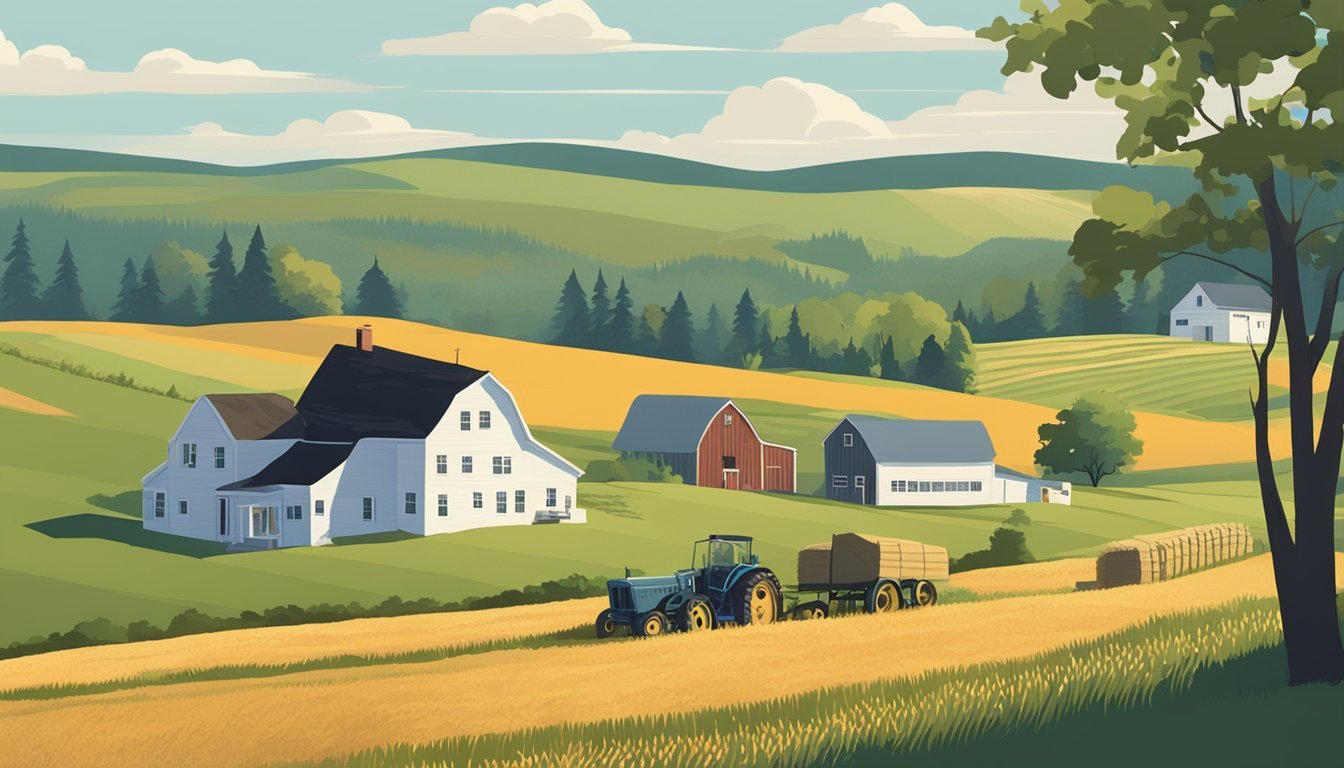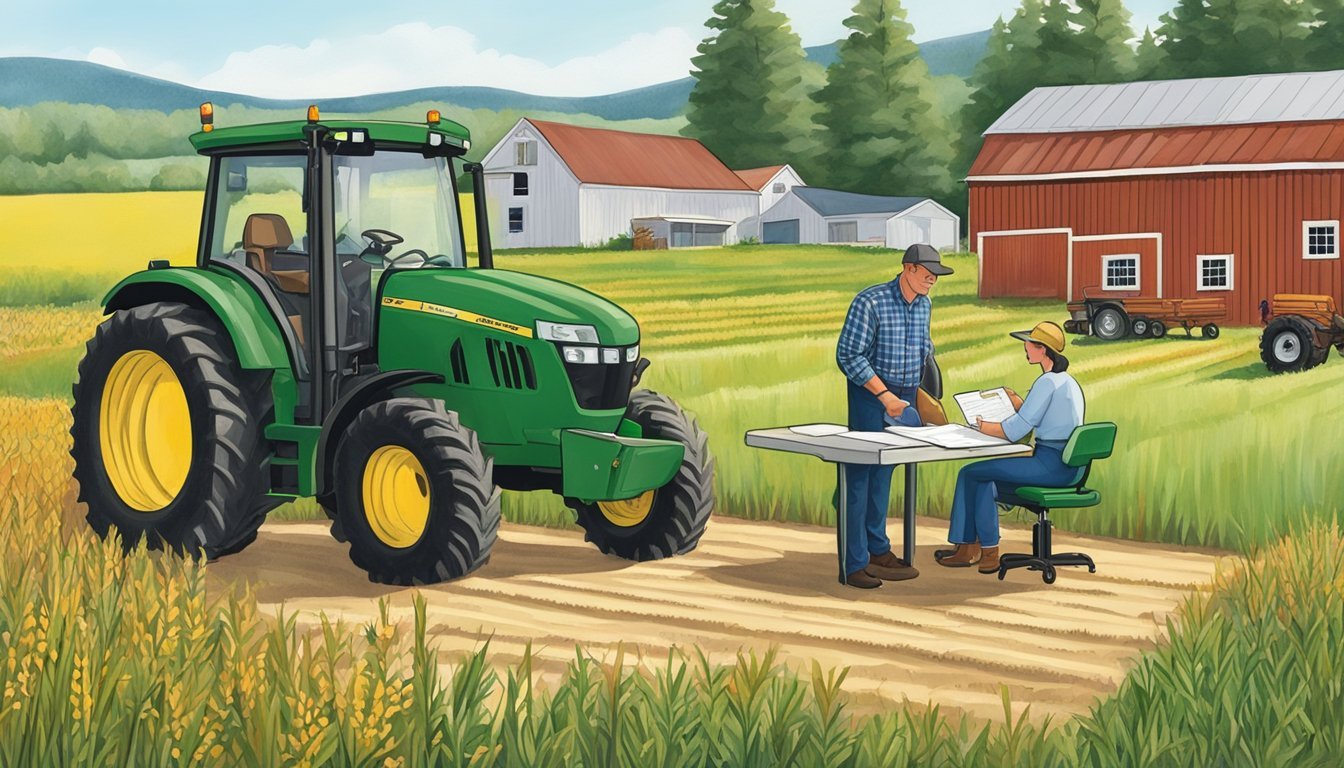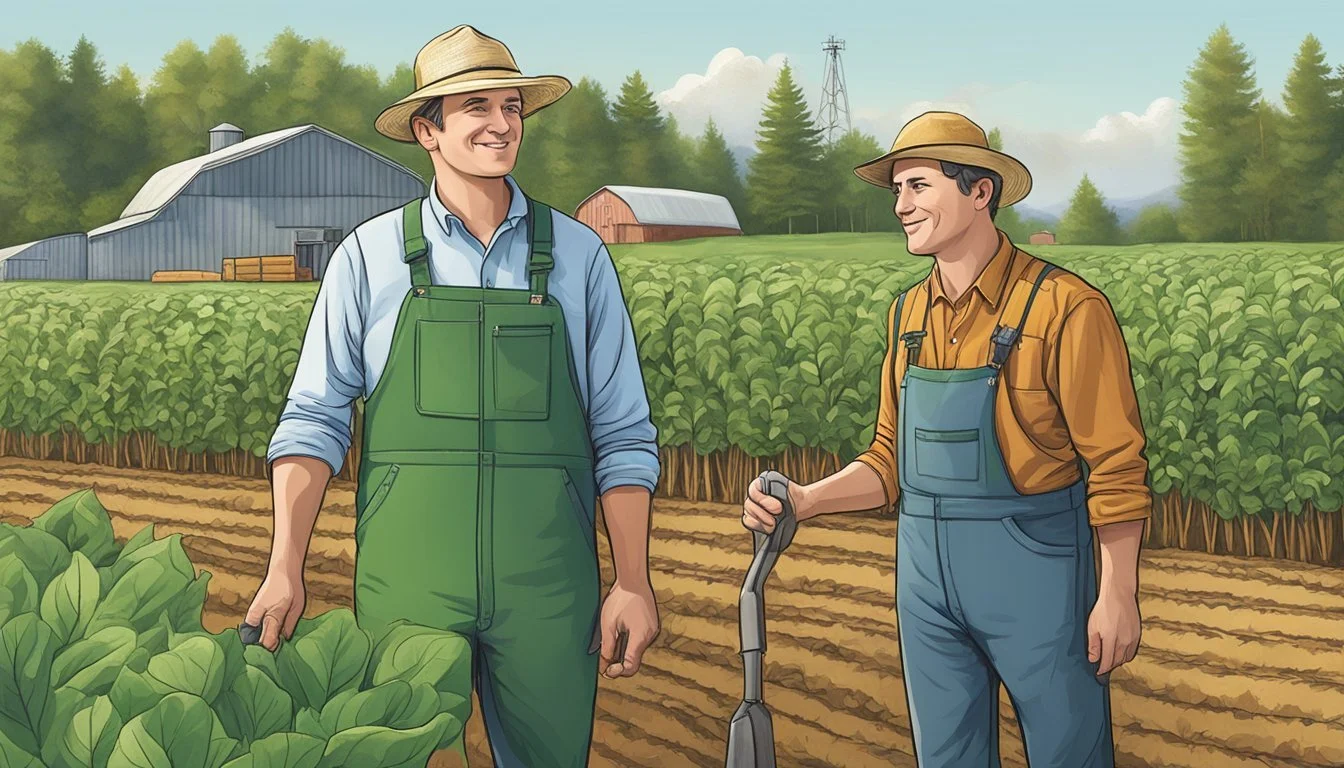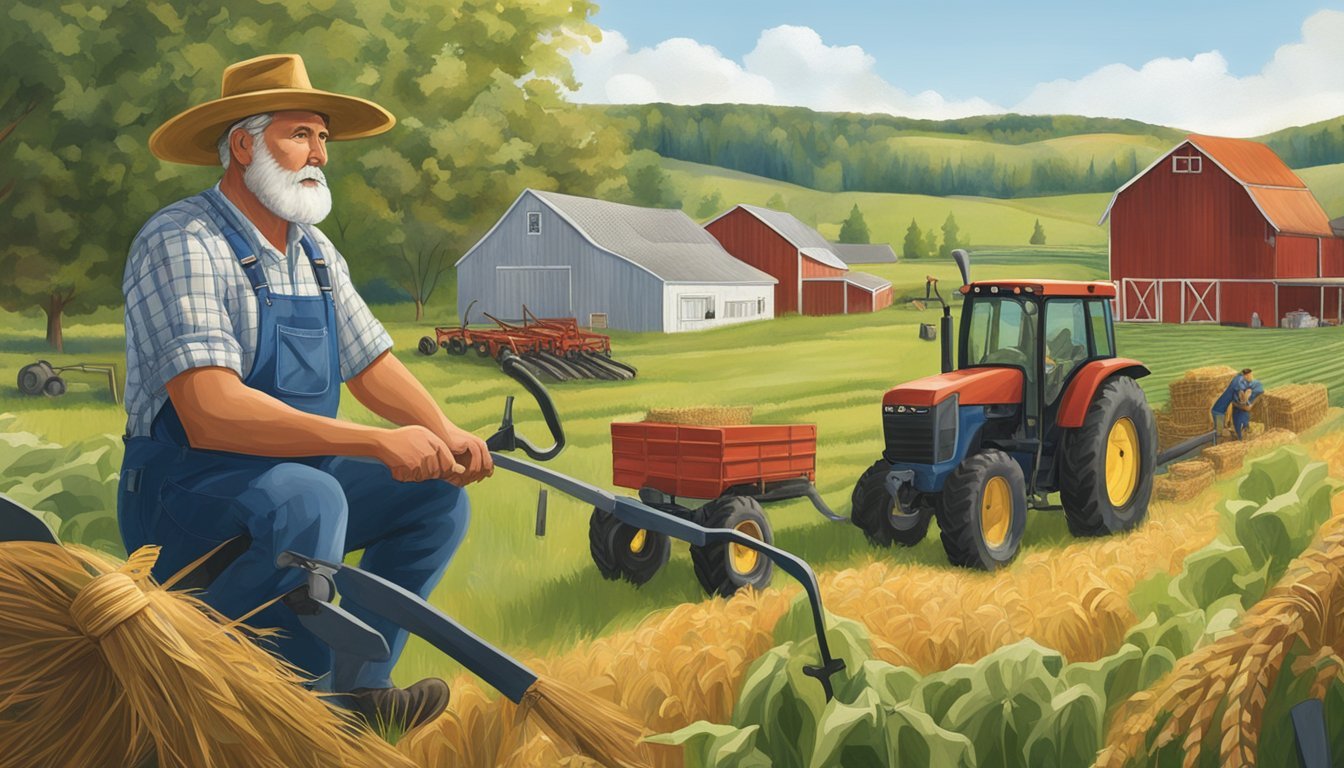Farm Loans in Maine
Navigating Options for Agricultural Financing
This Article is Part of Our Guide on Farm Loans for All 50 U.S. States
Agriculture plays a crucial role in the economy and culture of Maine, with a rich history of family farms and fresh, locally-grown produce. However, modern farming operations require significant capital for start-up costs, maintenance, and growth. Recognizing this, Maine offers a variety of farm loans and financial support mechanisms designed to help farmers thrive. These loans are tailored to support the diverse needs of Maine's agricultural community, including funding for land purchases, equipment, and operational costs.
Specialized programs such as the Maine Farms for the Future initiative provide competitive grants and financing options that are crucial for developing and implementing ideas geared towards enhancing farm profitability. Simultaneously, the availability of low-interest loans from sources like the Rural Rehabilitation Trust Fund demonstrates the state's commitment to supporting its farmers. These financial products cater to the unique challenges faced by farmers, including seasonal cash flows and the necessity of investing in sustainable and competitive agricultural practices.
In addition, various organizations within Maine offer guidance on navigating the complex landscape of agricultural financing. From FarmStart programs by Farm Credit East, which assist in the early stages of a farm business, to cooperative extensions that compile resources for payments, grants, and loans, there's a network of support aimed at sustaining and advancing the state's agricultural endeavors. These resources ensure that farmers in Maine have access to the financial tools they need to grow and remain competitive in the changing marketplace.
Overview of Farm Loans
In Maine, farm loans serve as indispensable financial resources for farmers and ranchers. These loans are designed to bolster operations, enhance land ownership opportunities, and provide the necessary capital for agricultural activities.
Farm Service Agency (FSA) programs include direct and guaranteed farm ownership loans, as well as down payment loans. These are structured to assist farmers in acquiring farmland and supporting their business endeavors.
The Department of Agriculture, Conservation & Forestry in Maine is a contact point for farmers seeking information on agricultural loans and grants. This entity plays a pivotal role in connecting producers to financing programs suited to their needs.
Farm Plus Financial specializes in ranch and farm loans in Maine, offering competitive interest rates. Their expertise lies in tailor-made financial solutions that cater to the unique demands of the agricultural sector.
FarmStart: An initiative by Farm Credit East, supports nascent agribusinesses with working capital investments up to $75,000. Aimed at agricultural ventures in their initial years, this program seeks to empower early-stage growth.
USDA's Farm Loans Overview indicates that farm operating loans can cover a wide array of needs from operating expenses to minor real estate repairs. For direct farm loans, amounts can reach up to $400,000.
Financial institutions like Community Development Financial Institutions (CDFIs), Non-Governmental Organizations (NGOs), and Community Development Corporations (CDCs) provide alternative, non-traditional financing sources that complement federal programs.
In summary, Maine's agricultural financing landscape is robust, offering a suite of loan options to support the state's diverse agricultural community.
Maine's Agricultural Landscape
The agricultural sector in Maine is marked by its diverse array of farms and innovative agricultural programs aimed at sustainability and economic growth.
Profile of Maine Farmers
Maine farmers have traditionally been recognized for their resilience and versatility, adapting to both the physical and market landscapes. They manage a variety of farm types, ranging from small-scale family operations to larger commercial ventures. Infrastructure enhancement has been a continuous aspect, with investments aimed at improving farm productivity and connectivity to markets. Maine's agriculture is noted for its wild blueberries, a state icon, with Maine producing the majority of the nation's supply. Besides this, the state is also a significant producer of maple syrup, with practices honed over generations contributing to the local economy. Aquaculture also represents a growing sector, complementing traditional farming with marine-based production such as shellfish and seaweed.
Maine Farms for the Future
The "Maine Farms for the Future" program is a strategic initiative aimed at supporting and nurturing the development of agriculture within the state. Through a phased approach, it provides business planning grants and the opportunity for additional cash grants or low-interest loans for capital investments in agricultural marketing. Eligibility extends to those who have successfully completed a business plan under Phase 1 and are undertaking projects identified through that plan. This program underscores Maine's commitment to agricultural innovation and the long-term viability of its farms.
Loan Programs for Maine Farmers
Maine farmers have access to a variety of loan programs and grants designed to promote agricultural success and sustainability. These programs are tailored to assist with everything from farm expansion to resilience building in agricultural operations.
USDA Farm Loan Programs
The United States Department of Agriculture (USDA) operates through its Farm Service Agency (FSA) to offer loan programs to farmers in Maine. There are two primary types of loans available:
Direct Loan: This type offers financing directly from the FSA and includes:
Farm Ownership Loans for buying land, constructing buildings, and improving farms.
Operating Loans to cover costs associated with daily farm operations.
Guaranteed Loan Program: In this program, the USDA guarantees up to 95% of the loan made by a conventional lender. This type of loan includes similar purposes as the Direct Loan program but is backed by the federal government to reduce the risk to lenders.
These USDA loans are also intended to support underserved and beginning farmers, ensuring that various financial resources are available to foster growth and innovation in Maine's agricultural sector.
Maine's Agricultural Development Grants
The state of Maine offers Agricultural Development Grants to local farmers with the aim of enhancing farm profitability and encouraging sustainable practices. Key grants include:
Maine Farms for the Future (FFF): This is a competitive grant program designed to help farmers develop and implement projects that can improve their farm's profitability and ensure long-term viability.
Resilient Food Systems Infrastructure Program (RFSI): The focus of RFSI is on bolstering the resilience of Maine's food systems infrastructure. It promotes stability and sustainability across the state’s agricultural landscape.
Farmers can apply for grants through the Agricultural Resource Development Division in Maine, which provides both financial and technical assistance to strengthen farm enterprises.
These programs, both federal and state, offer vital financial support to Maine's agricultural community, ensuring that farmers have the necessary resources to maintain and grow their operations.
Financial Support for Purchase and Operations
Farm owners in Maine have access to diverse financial assistance to secure farm ownership and cover operational costs. Financial support aims not only to preserve the vital agricultural legacy of the state but also to bolster the economic viability of its farms through strategic investments and working capital provision.
Investing in Equipment and Livestock
Equipment and Livestock Purchases are central to maintaining a productive farm. Financing options available through entities such as the USDA Farm Service Agency and Coastal Enterprises, Inc. allow farmers to invest in:
Machinery: Tractors, harvesters, and other essential equipment.
Livestock: Cattle, poultry, and other farm animals pivotal for diversification and revenue.
These loans typically provide fixed rates, ensuring financial predictability for borrowers.
Operational Expenses and Working Capital
Operational Expenses often include but are not limited to:
Seed and fertilizer purchases.
Utility costs integral to farm operations.
To manage these expenses, financial support in the form of Working Capital is crucial. Working capital loans are structured to match cash flow, aiding farmers in Maine to address immediate and short-term financial obligations efficiently. The USDA's initiative to offer farm operating loans online simplifies the application process, enhancing accessibility for farmers to secure necessary funds.
Loan Conditions and Application Process
The process for securing farm loans in Maine involves a thorough assessment of eligibility, with an emphasis on character, creditworthiness, collateral, and income. Following eligibility, applicants must navigate the application steps with precision to ensure compliance and increase the chances of loan approval.
Assessing Loan Eligibility
Eligibility Conditions: A prospective borrower's credit history is a primary factor in loan consideration, which reflects their character and reliability. USDA loan officers assess this alongside the applicant's income to ensure sufficient cash flow to meet repayment obligations. Collateral in the form of farm assets or real estate is required to secure the loan. The conditions set by the USDA also stipulate that applicants must meet specific requirements geared toward farm ownership.
Character: Loan officers evaluate an applicant's credibility and track record in financial matters.
Collateral: Applicants must offer assets that secure the loan's value.
Income: Verifiable income documentation is essential to demonstrate the ability to repay the loan.
Navigating Loan Applications
Navigating the loan application process involves careful preparation and adherence to USDA guidelines. Applicants should:
Determine if they meet the eligibility criteria.
Ensure they have a detailed farm business plan.
Submission:
Apply through the appropriate USDA Service Center or online.
Include all required supporting documentation.
Communication:
Keep in regular contact with a loan officer for updates and guidance.
Respond promptly to any inquiries or requests for additional information.
The USDA has made efforts to streamline the application process with online tools, making it more accessible for Maine farmers to apply for loans and manage their farm finances.
Support Programs for Beginning and Minority Farmers
Maine offers a variety of support programs specifically designed to assist beginning farmers and minority agricultural communities. These initiatives aim to provide the necessary resources to foster successful farming ventures and enhance diversity in agriculture.
Programs for Beginning Farmers
The Farm Service Agency (FSA), an agency of the U.S. Department of Agriculture (USDA), is a key player in providing support to beginning farmers in Maine. The FSA's farm ownership and farm operating loans cater to the unique needs of individuals who are just starting their journey in farming.
Farm Ownership Loans: These loans assist beginning farmers in purchasing farmland, constructing and repairing buildings, and making farm improvements.
Farm Operating Loans: Beginning farmers can use these loans to cover operational expenses such as livestock, equipment, feed, seed, and fertilizer.
The Beginning Farmer and Rancher Development Program (BFRDP), another initiative by the USDA's National Institute of Food and Agriculture (NIFA), awards competitive grants used for educational programs, aimed at supporting new farmers and ranchers. Resources developed under this program can be found on Farmers.gov and include:
Educational materials for business planning.
Online tools and data for farm management.
Outreach for Diverse Agricultural Communities
To achieve the goal of inclusivity, FSA has earmarked funds for underserved farmers and ranchers, which comprise women, African-Americans, Alaskan Natives, American Indians, Hispanics, and other minority groups.
The agency ensures that a portion of:
Guaranteed loan funds,
Direct Operating and Direct Farm Ownership loan funds,
Microloan funding, and
Youth loans,
are targeted to these historically underserved groups. This commitment helps to level the playing field and opens opportunities for diverse farmers to contribute to and benefit from Maine's agricultural sector.
Outreach efforts in Maine often involve collaborations with local organizations and academic institutions to provide training, networking opportunities, and direct assistance in accessing USDA programs.
Financial Planning and Farm Business Management
Effective financial planning and farm business management are essential for the success and sustainability of agricultural businesses in Maine. They ensure that farmers have sufficient equity to operate efficiently, make informed decisions, and maintain business vitality.
Understanding Agricultural Business
Agricultural business management involves comprehending the unique aspects of farm operations and the market. Owners need to assess the value of their equity—which is the difference between the assets and liabilities of the farm—to gauge their farm's financial health. Good management means knowing one's current equity position, and optimizing it to ensure the farm can sustain operations and grow.
Asset assessment: Evaluating all tangible and intangible items of value, such as land, equipment, livestock, and intellectual property.
Liability evaluation: Determining outstanding debts and other financial obligations.
Equity calculation: Subtracting total liabilities from total assets to establish net worth.
Strategic Planning and Financial Analysis
Strategic planning involves setting long-term goals and establishing a plan to achieve them. This is where financial analysis is key, as it helps farmers understand their business’s financial condition and the implications of financial decisions.
Cash flow management: Keeping track of cash inflows and outflows to ensure that the farm can meet its financial obligations.
Investment decisions: Using financial data to decide on capital investments like new equipment or expansion of operations.
Risk management: Identifying financial risks and devising strategies to mitigate them, which may involve diversifying income sources or purchasing insurance.
Farm business management integrates both understanding and strategic planning to steer the business towards achieving its goals while maintaining financial stability.
Funding Innovations and Market Opportunities
In Maine, the agricultural sector has access to various innovative funding streams and market opportunities that aim to enhance farm vitality and expand market reach. This availability of diverse funding solutions and the alignment with market trends provide Maine's farmers with a competitive edge.
Exploring Alternative Financing
The Agricultural Marketing Loan Fund is a critical resource for Maine farmers, offering low-interest financing options that support the development of agricultural products and the expansion of food processing. This fund enables them to engage in capital improvement with an emphasis on increasing efficiency and boosting market competitiveness.
Coastal Enterprises, Inc. propels this innovation further by giving farmers access to financing options that range from microloans suitable for small-scale needs to substantial investments over $500,000. These funds can be utilized for varied purposes including farm mortgages, operations, equipment, and other essential working capital needs, all of which are crucial elements for business growth and sustainability.
Harnessing Market Trends
Staying attuned to market trends, Maine's farmers can leverage the USDA Specialty Crop Block Grant Program. This competitive grant program finances initiatives focused on market research, promotion, and the adoption of new technologies. Such initiatives are aimed at enhancing the market presence of specialty crops, allowing farmers to tap into evolving consumer preferences and emerging markets.
Moreover, the Dairy Improvement Fund supplies targeted financial support to bolster Maine's dairy sector. By funding infrastructure improvements and adoption of advanced technologies, dairy farms can improve their product quality, enhance productivity, and better meet market demands.
These programs not only provide financial support but also encourage farmers to innovate and find new market channels that align with current consumer trends and demands, propelling the local agricultural community towards a more prosperous future.
Challenges and Considerations in Farm Financing
Securing farm financing in Maine involves navigating various challenges and adapting to economic conditions. It is important for farmers to be aware of different financial options, including grants, loans, and credit programs, to successfully manage their agricultural enterprises.
Addressing Common Financial Challenges
Farmers often encounter the Rural Rehabilitation Trust Fund which provides financial support aimed at improving agricultural operations and rural development. Despite its benefits, potential borrowers need to carefully assess terms to ensure they align with their business plans. Refinancing existing loans can also be a strategic move to manage debt if a farmer secures lower interest rates, ultimately affecting the overall financial health of the farm operation.
A common financial challenge is dealing with fluctuating interest rates. Farmers must stay abreast of rate changes as these can significantly impact loan repayments. They should consider fixed-rate options to provide consistent payment schedules and protect against rising rates in an unpredictable market.
Adapting to Economic Conditions
Economic conditions such as inflation affect input costs and commodity prices, making financial planning more complex. The Inflation Reduction Act may offer opportunities for farmers to invest in infrastructure and technology that can lead to long-term cost savings, though they must weigh this against the immediate financial outlay.
Farmers must remain adaptable, scrutinizing their financial positions and prospects. This might involve re-evaluating their business plans to align with current economic realities, or exploring alternative funding sources to maintain or expand their operations amidst shifting economic landscapes.
Resources and Support Networks
Maine offers a robust network of resources and support systems aimed at bolstering farm businesses through state and federal aid, alongside communal networking opportunities that ensure sustained growth and productivity.
State and Federal Resources
Maine's Department of Agriculture, Conservation, and Forestry actively supports agricultural ventures through initiatives like the Maine Farms for the Future Program. This competitive grant program is designed to provide business planning assistance and investment support to qualified farms, thereby promoting farm vitality and innovation. Farms may receive grants to explore "Ideas for Change" that can lead to increased business success.
On the federal level, the USDA Farm Service Agency administers Farm Operating Loans and Farm Ownership Loans in Maine. These loans cater specifically to farmers' needs, providing essential capital for operations and farm acquisitions.
Farm Operating Loans: Working capital for equipment, seed, and livestock.
Farm Ownership Loans: Funds to purchase farmland, construct buildings, or make farm improvements.
In partnership with the state, organizations like Farm Credit East offer FarmStart, an investment program allocating up to $75,000 to promising agricultural businesses, especially those in their initial years.
Networking for Success
The Maine Farmer Resource Network stands out as a coalition of local agricultural agencies and organizations dedicated to connecting farmers with valuable resources. They provide a directory highlighting assistance for both aspiring and established farmers, driving knowledge-sharing and collaboration within the farming community.
Networking platforms like the Maine Farmer Resource Network and the Beginning Farmer Resource Network of Maine also emphasize organic farming, environmental stewardship, and community support. These networks assist farmers in growing their production capabilities, thus advancing Maine's agricultural landscape. Furthermore, the collaboration fosters a connection between healthful food and sustainable farming practices, crucial for Maine's food system and rural communities.











